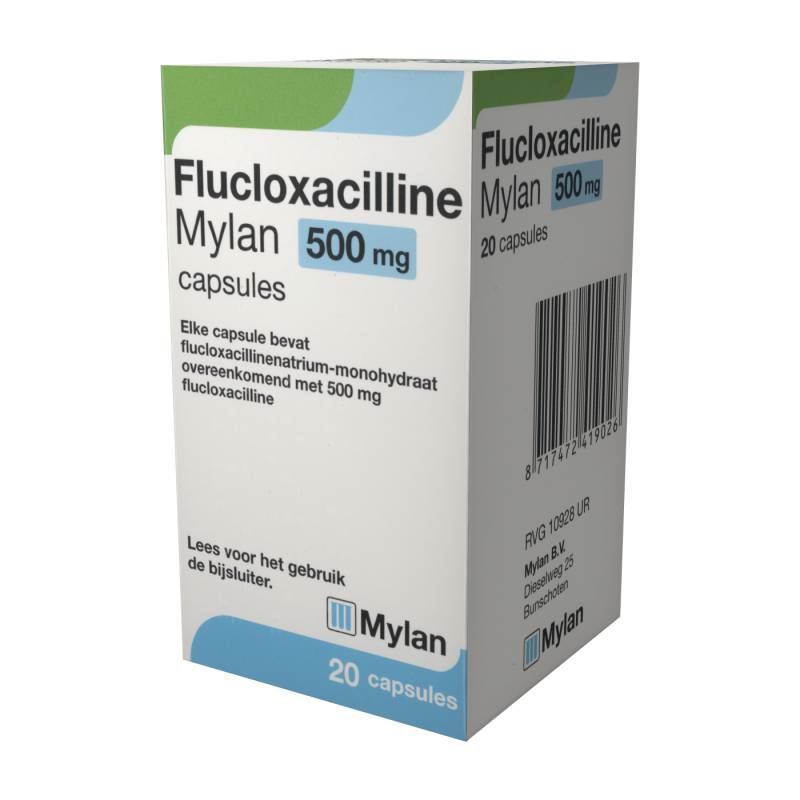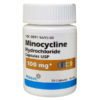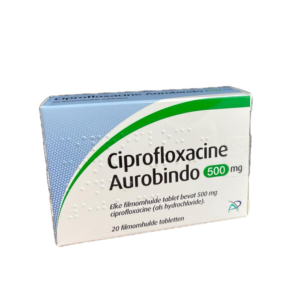Flucloxacilline Kopen
€59.95
Flucloxacillin mylan | buy flucloxacillin without a prescription | Flucloxacillin Mylan 500mg
Flucloxacillin is an antibiotic belonging to a group of drugs called penicillins. These drugs work by killing the bacteria that cause infection. It is used to treat infections caused by bacteria. Examples of some of the infections that can be caused by bacteria include respiratory tract infections and skin or fleshy tissue skin infections. Flucloxacillin does not work against infections caused by viruses, such as the common cold or flu.
Order cheap Flucloxacillin Mylan 500Mg discreetly online without a prescription, safe and reliable through our online pharmacy .
Flucloxacillin 500mg | Before taking flucloxacillin
Warning: Flucloxacillin can cause serious liver damage, especially in elderly
patients and those who take it for more than 14 days.
When you shouldn’t take it
Do not take flucloxacillin if you are allergic to:
• Medicines containing flucloxacillin or other penicillins;
• Cephalosporin antibiotics;
• Beta-lactam antibiotics;
• Any of the ingredients listed at the end of this leaflet.
Some symptoms of an allergic reaction may include a skin rash, itching or hives, swelling of the face, lips, tongue or other parts of the body, shortness of breath, wheezing or troubled breathing.
Do not take flucloxacillin if you have had a reaction that affected your liver while taking a medication containing flucloxacillin. Examples of liver reactions include hepatitis and jaundice (yellowing of the eyes or skin).
Do not take flucloxacillin if the expiration date has passed. If you are not sure whether you should start taking Flucloxacillin, talk to your doctor.
Flucloxacilline | Before you start taking it
Talk to your doctor or pharmacist before taking this medication:
If you take or will take paracetamol
There is a risk of blood and fluid abnormality (high anion metabolic acidosis) occurring when there is an increase in plasma acidity when flucloxacillin is used concomitantly with paracetamol, especially in certain groups of patients at risk, e.g. patients with severe renal impairment, sepsis or malnutrition, especially if the
maximum daily doses of paracetamol are used. High anion metabolic acidosis is a serious disease that needs urgent treatment.
Tell your doctor if you are allergic to any other medicines, foods, dyes, or preservatives.
Tell your doctor if you have any medical conditions, especially the following:
• liver problems;
• kidney problems;
• Asthma, hay fever, eczema or other allergic conditions.
Tell your doctor if you are pregnant or planning to become pregnant. Your doctor will discuss the risks and benefits of taking flucloxacillin during pregnancy.
Tell your doctor if you are breast-feeding or planning to breast-feed. A very small amount of flucloxacillin passes into breast milk. Your doctor will discuss the risks and benefits of taking flucloxacillin while breastfeeding.
If you haven’t told your doctor about any of the above, tell them before you start taking flucloxacillin.
This medicine may cause unwanted effects (e.g. allergic reactions, dizziness) which may affect the ability to drive and use machines. You must be careful when driving or using machines.
Flucloxacilline fk | Taking other medications
Tell your doctor if you are taking any other medications, including those you buy without a prescription from your pharmacy, supermarket, or health food store. You should also tell any health professional who prescribes a new drug for you that you are taking flucloxacillin.
Some medications may interfere with flucloxacillin. These include:
• Probenecid, a medicine used for gout;
• Some antibiotics, such as tetracycline and macrolide antibiotics.
These drugs may be affected by flucloxacillin, or may affect how well it works. You may need different amounts of your medicine, or you may need to take different medicines.
Some antibiotics may decrease the effectiveness of some birth control pills, although this has not been shown with flucloxacillin. Talk to your doctor about the need for extra birth control while taking flucloxacillin.
Your doctor or pharmacist has more information about drugs to be careful with oravoid while taking flucloxacillin.
How to take flucloxacillin
How much to take
Your doctor will tell you how much to take each day and when to take it. This depends on your condition and whether or not you are taking any other medications.
For most infections, the usual adult dose is 250 mg every six hours, but this depends on the severity of the infection.
If you have kidney problems, your doctor may tell you to take a lower dose. Follow all directions given by your doctor carefully.
Swallow the capsules whole with a glass of water. Take flucloxacillin on an empty stomach, for example half an hour before meals or just before going to bed. Food may interfere with the absorption of flucloxacillin.
How long to take it
Keep taking flucloxacillin until you finish the pack, or for as long as your doctor recommends. Do not stop taking flucloxacillin even if you feel better after a few days, unless advised by your doctor. Your infection may not be completely clear if you stop taking your medicine too soon.
If you forget to take flucloxacillin
If it is almost time for your next dose, skip the dose you missed and take your next dose when you are supposed to. Otherwise, take the missed dose as soon as you remember, then go back to taking your capsules as you normally would.
Do not take a double dose to make up for the dose you missed.
If you are not sure what to do, ask your doctor or pharmacist for advice.
Flucloxacillin side effects
Like all medicines, flucloxacillin can cause side effects in some people, although not everyone will get them.
Common side effects
Common side effects of flucloxacillin occur in more than 1 in 100 people. Keep taking the medicine, but tell your doctor or pharmacist if these side effects bother you or don’t go away:
- being sick (nausea) or being sick (vomiting);
- diarrhea;
- bloating and indigestion;
Serious side-effects
Serious side effects are rare and happen to less than 1 in 1,000 people.
Call a doctor if:
- you get diarrhea (possibly with muscle cramps) containing blood or mucus, or severe diarrhea lasting more than 4 days;
- You have pale poop with dark pee, and the whites of your eyes or skin turn yellow (this may be less obvious on black or tan skin) – this could be a sign
- are from liver problems;
- You get bruises or discolored skin;
- You have joint or muscle pain that starts to happen after 2 days of taking the drug;
Some of these serious side effects may not happen for 2 months after finishing the flucloxacillin course.
Gerelateerde producten
Antibiotica Kopen
Antibiotica Kopen
Antibiotica Kopen
Antibiotica Kopen
Antibiotica Kopen
Antibiotica Kopen
Antibiotica Kopen
Antibiotica Kopen











